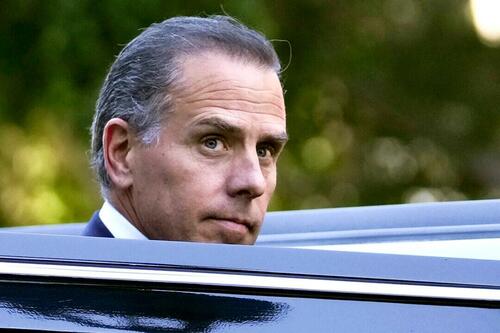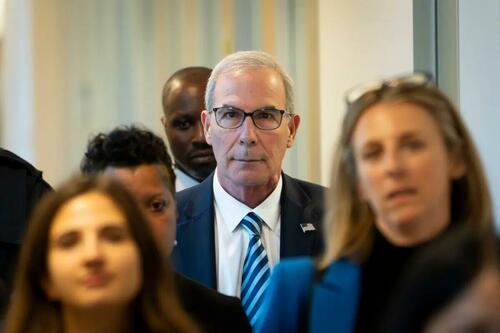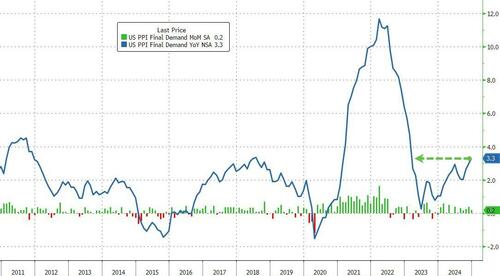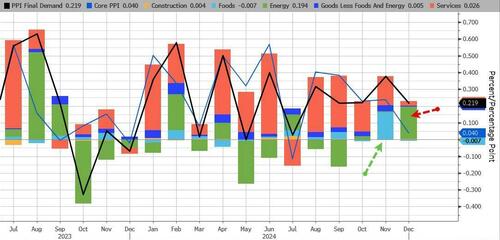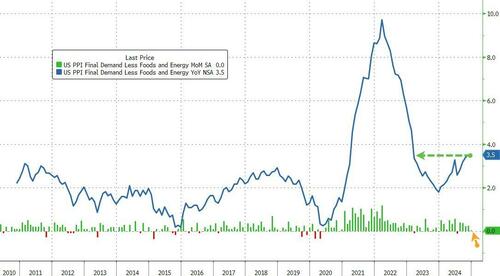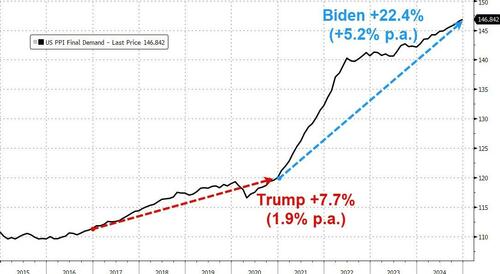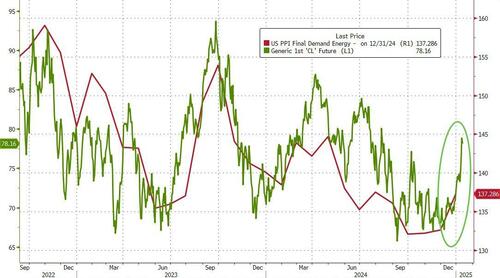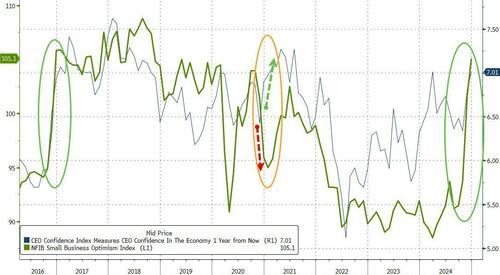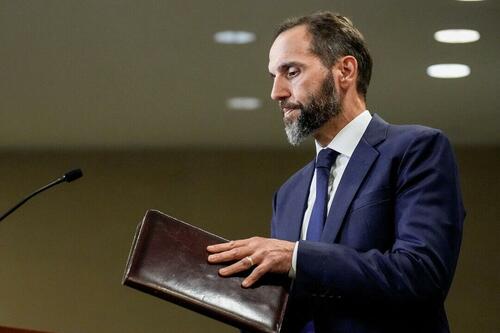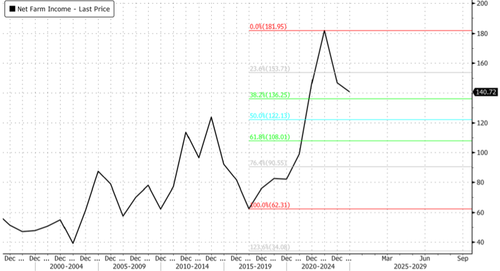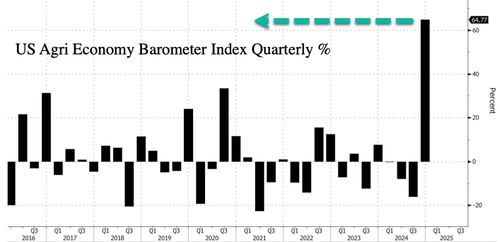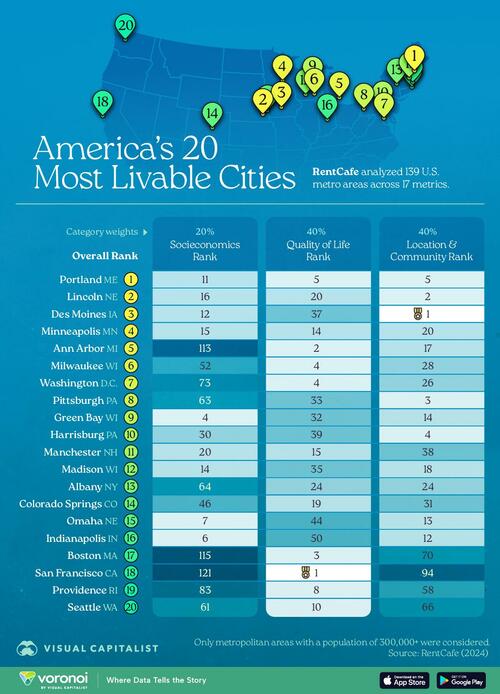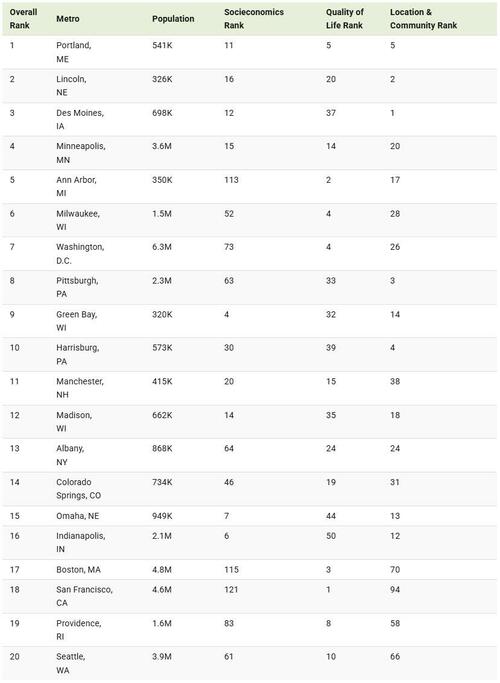Global stocks and US futures jumped and the dollar slumped after a Bloomberg report that Trump’s incoming economic team is considering a gradual ramp-up in trade tariffs in a strategy that could avert a crippling spike in inflation and which JPM called “more scalpel than broad sword approach which the market seems to like.” With bond yields flat and USD weaker, as of 7:30am S&P futures are 0.3% higher and Nasdaq 100 futures gained 0.6%, and on track to snap a two-day run of losses, as all Mag7 names advanced in premarket trading, with Nvidia and Tesla up more than 2%. European bourses were green across the board, and Asian markets also bounced while emerging markets emerged from their worst start to a year since 2016. In short, until and unless Trump denies the Bloomberg report, it appears to be a broad-based rally today, into PPI and tomorrow’s CPI. Commodities are seeing some profit-taking today with Ags/Energy lower, but Metals still bid up. Today’s macro data focus includes NFIB Small Biz Optimism, PPI, Federal Budget Balance, and 2x Fedspeakers.
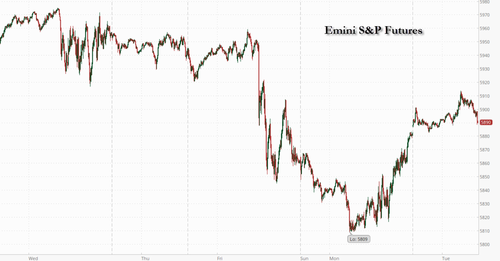
Similar to a WaPo report last week, Bloomberg News quoted “people familiar with the matter” as saying graduated tariff hikes of about 2% to 5% a month are under discussion, rather than aggressive one-time increases. “A slower and steadier tariff approach would perhaps remove a degree of upside inflation risk and a degree of downside growth risk, so everyone is getting cautiously optimistic again,” said Pepperstone strategist Michael Brown, who however correctly cautioned that Trump has previously dismissed any suggestions of a more moderate tariff strategy. “That’s perhaps why we are seeing some of the initial optimism fade a little bit,” he said.
The Bloomberg report knocked the dollar index lower after five straight days of gains, while global bond markets steadied after a sharp run-up in borrowing costs in recent days. However, an earlier drop in 10-year Treasury yields subsided, keeping borrowing costs near the October 2023 highs hit Monday after traders slashed bets on Federal Reserve interest-rate cuts.
The latest word on tariffs comes at a time when markets are increasingly fearful of an inflation resurgence that prevents central banks, especially the Fed, from cutting rates as much as expected earlier. According to a majority (but not all) market participants, Trump’s policies, including mass deportations and higher trade levies, would lead to higher inflation. The flipside of course is that a trade war would lead to a global economic slowdown which would lead to rapid rate cuts, something which apparently nobody is considering. Inflation fears make this week’s US inflation data all the more crucial, especially if it signals the disinflation trajectory had already stalled at the end of last year. Producer inflation is due later Tuesday, followed by a CPI report on Wednesday, and December retail sales numbers that could confirm robust holiday-season spending.
Focus is also turning to the US corporate earnings season, with banks including Citigroup Inc., JPMorgan and Goldman reporting on Wednesday. Fourth-quarter earnings-per-share on the S&P 500 is expected to climb 7.3% from the year-earlier period, according to Bloomberg. Despite the solid growth, recent losses on the S&P 500 have wiped out its 2025 gains, with sentiment also hurt by the prospect of sweeping new limits on the sale of advanced AI chips by Nvidia.
“There’s been a swing back from the exuberance of the Trump election,” said Raphael Thuin, head of capital market strategies at Tikehau Capital in Paris. “The market is hoping for the upcoming earnings season to provide some reassurance.”
According to multiple reports, Chinese officials weighing an option that involves Elon Musk acquiring the US operations of TikTok if the company fails to fend off a ban. In other news, Donald Trump and Joe Biden both said they are optimistic a ceasefire between Israel and Hamas could be agreed within days, pausing the devastating war in Gaza.
In Europe, the Stoxx 600 index gained 0.5%, led by auto, technology and bank stocks. French stocks outperformed, receiving an additional boost from the possibility of a political agreement that could prevent a government collapse. Among individual stocks, oil stock BP falls after the company flags broad weakness across its business. Ocado soars on a strong retail update and chocolatier Lindt gains on firm margins. Here are some of the biggest movers on Tuesday:
- Ocado shares rise as much as 14% after its grocery arm reported an acceleration in sales growth during the final quarter of 2024
- Lindt shares gain as much as 5.7% after the Swiss chocolate maker posted robust sales growth and said it gained market share
- Persimmon shares rise as much as 7.4% after the UK housebuilder said it built more homes than anticipated in 2024, which will help its annual underlying profit before tax come in at the upper end of market expectations
- JD Sports shares slide as much as 13% after the sports retailer downgraded its full-year pretax profit guidance following a softer-than-expected fourth quarter trading update
- BP shares slide as much as 3.1% after the company reported weakness across the board in its 4Q business, and announced a delay in presenting its new strategy
- British American Tobacco shares slump as much as 2.9% after Reinet Investments SCA agreed to sell its 2% stake in the firm, exiting its long-running position in the company
- Remy Cointreau falls as much as 6.6%, the most since October, after Bank of America downgraded the French spirits maker to underperform on account of a “hard to justify” premium vs. peers
- Carlsberg, meanwhile, gains as much as 3.2% after the bank calls the stock “underappreciated”
- Hunting shares rise as much as 13%, after the energy services provider confirmed earnings should meet expectations in 2024, while its cashflow in the final quarter was stronger than forecast
- Temenos shares gain as much as 9.6% after the Swiss banking software company announced preliminary 4Q24 results with meaningful outperformance relative to company consensus
- European Mining stocks climbed to as iron ore surged back above the $100-a-ton threshold, following data showing that China’s annual imports of the steel-making ingredient reached a record and its trade surplus soared
- Games Workshop shares fall as much as 4.2% after strong results were accompanied by some cautious comments on potential US tariffs and cost inflation
Earlier, Asian markets rebounded with Chinese equities leading gains as news that US President-elect Donald Trump’s team is considering taking a gradual approach to raising tariffs buoyed sentiment. The MSCI China Index snapped a six-day losing streak, climbing more than 2.7%, its best return in a month, as the nation’s top securities regulator said it will work on building a mechanism to stabilize the market. More broadly, the MSCI Asia Pacific Index rose as much as 0.6%, with Tencent and Meituan among the top contributors to its advance. Equities in India also rebounded following a selloff in the previous session. Still, the Asian benchmark’s advance was held back by losses in Japanese chip-related companies after new US restrictions on semiconductor exports fueled caution toward the sector. Japanese shares closed at their lowest level since November 2024.
In rates, treasuries are steady ahead of US producer price data, with 10-year yields steady at 4.78% while 5s30s spread is steeper by ~1.3bp. Gilts gapped higher at the open before reversing gains with UK 10-year borrowing costs now unchanged at 4.88%. The French-German 10-year yield spread narrowed slightly after the Socialist party head said they may be nearing an agreement with the government. US session includes December PPI data, and another heavy slate of investment-grade corporate bond offerings is expected.
In FX, the yen is the weakest of the G-10 currencies, falling 0.3% against the greenback. The pound isn’t far behind with a 0.2% drop. The Bloomberg Dollar Spot Index saw choppy price action after Bloomberg report that Trump’s economic team is discussing a gradual approach to tariffs, increasing by 2%-5% per month, to boost negotiating leverage and avoid inflation
In commodities, WTI falls 0.7% to $78.30 as traders monitor the prospect of a cease-fire deal between Israel and Hamas. Spot gold is steady near $2,666/oz. Bitcoin rises above $96,000.
Looking at today’s calendar, US economic data calendar includes December PPI (8:30am) and federal budget balance (2pm). Fed speaker slate includes Schmid (10am) and Williams (3:05pm)
Market Snapshot
- S&P 500 futures up 0.6% to 5,908.00
- STOXX Europe 600 up 0.5% to 511.03
- MXAP up 0.4% to 176.44
- MXAPJ up 1.3% to 556.62
- Nikkei down 1.8% to 38,474.30
- Topix down 1.2% to 2,682.58
- Hang Seng Index up 1.8% to 19,219.78
- Shanghai Composite up 2.5% to 3,240.94
- Sensex up 0.2% to 76,463.88
- Australia S&P/ASX 200 up 0.5% to 8,231.00
- Kospi up 0.3% to 2,497.40
- German 10Y yield up 1 bp at 2.62%
- Euro up 0.2% to $1.0261
- Brent Futures little changed at $81.09/bbl
- Gold spot up 0.2% to $2,669.08
- US Dollar Index down 0.38% to 109.54
Top Overnight News
- US President-elect Trump’s team reportedly studies month-by-month tariff hikes of 2%-5% with Bessent, Hassett and Miran discussing gradual tariffs, although Trump still hasn’t reviewed or approved the gradual tariff idea: Bloomberg.
- Elon Musk’s social media empire may be about to expand. Chinese officials are weighing having X take control of TikTok US if the app is banned, people familiar said, though it’s unclear whether the parties have held any talks. BBG
- US President-elect Trump does not plan to attend the World Economic Forum in Davos but may make virtual remarks to the gathering, according to a source familiar with the planning cited by Reuters.
- Chinese banks’ new loans posted their first decline since 2011 last year, underscoring weak demand for financing. The PBOC reiterated its goal to keep the yuan stable — something that’s been worsening a liquidity squeeze. BBG
- Chinese refiners are rushing to buy oil from the Middle East and elsewhere in response to the latest round of sanctions against Russia’s energy industry. BBG
- Japan’s 40-year government bond yield reached the highest level since its debut as BOJ Deputy Governor Ryozo Himino signaled a rate hike may come next week. BBG
- European Central Bank Governing Council member Olli Rehn expects euro-zone interest rates to reach a level that no longer restricts economic activity by mid-2025. BBG
- Israel and Hamas are finalizing the terms of a cease-fire deal that could be announced as soon as Tuesday, Arab and Israeli officials said, raising hopes of an agreement that would at least pause the fighting in the Gaza Strip and free some of the hostages held there. WSJ
- Trump economic officials are discussing a proposal whereby tariffs would be “slowly ramped up” on a “month by month” basis (perhaps by 2-5%) in a manner aimed at increasing White House negotiating leverage while avoiding an inflation. BBG
- President-elect Donald Trump is likely to maintain new US limits on global sales of AI chips by Nvidia Corp. and others, a top Biden administration official said, citing bipartisan national security concerns surrounding China’s pursuit of advanced technology. BBG
- House Speaker Mike Johnson confirmed to reporters Monday there’s “been some discussion” of tying California wildfire aid to a debt limit increase, after GOP members raised the issue with Donald Trump in several meetings at the President-elect’s Florida resort this weekend. Politico
- US President Biden administration has awarded a further USD 210mln in tech hub grants, according to the Commerce Department.
A more detailed look at global markets courtesy of Newsquawk
APAC stocks traded mixed following the similar performance stateside where price action was choppy as most indices attempted to nurse post-NFP losses although the Nasdaq remained pressured on tech weakness, while Japanese stocks were heavily pressured on return from the long weekend. ASX 200 gained with outperformance in the commodity-related sectors but with the upside capped after weak consumer confidence data. Nikkei 225 slumped as it took its first opportunity to react to the post-NFP higher yield environment and last week’s source reports of the BoJ mulling a rate decision for its meeting next week, while comments from BoJ Deputy Governor Himino also suggested the upcoming meeting is live. Hang Seng and Shanghai Comp outperformed despite the recent announcement by US and allies of new controls on AI chips, with participants awaiting the PBoC and FX regulator’s looming briefing on financial support for the economy, while there was also a report that the Trump team is studying gradual month-by-month tariff hikes of 2%-5%.
Top Asian News
- India is likely to project nominal GDP growth of 10.3-10.5% in its budget for the next fiscal year, via Reuters citing sources; expects this fiscal year’s budget gap to come in 10-20bps lower than initially predicted 4.9% of GDP.
- China to cut pay of staff at the top three financial regulators by “about half”, including the PBoC; with effect this month, according to Reuters citing sources.
- US President-elect Trump is considering trade lawyer Jeffrey Kessler for a key China role heading the Commerce Department’s Bureau of Industry and Security.
- China is increasing its scrutiny of exports by Apple (APPL) and other US tech companies which is hampering their efforts to expand production in Southeast Asia and India as tighter customs checks related to dual-use technology export controls have resulted in delays of days and weeks on shipments of production equipment to Vietnam and India, according to people familiar with the matter cited by Nikkei.
- PBoC Deputy Governor says will adjust and improve policy force and its pace at proper time to support China’s FY economic and social development targets; to continue to take measures to keep CNY level basically stable at reasonable and balanced level. PBoC Deputy Governor says will adjust and improve policy force and its pace at proper time to support China’s FY economic and social development targets; to continue to take measures to keep CNY level basically stable at reasonable and balanced level.
- US lawmakers urged President Biden to extend January 19th deadline to prevent TikTok ban if Supreme Court does not block the law, while was separately reported that China discussed the sale of TikTok’s US operations to Elon Musk as a possible option, according to Bloomberg.
- BoJ Deputy Governor Himino said in conducting monetary policy, it is necessary to pay close attention to short-term developments in economic activity, prices, and financial conditions and noted that inflation expectations have risen from below 1.0% to around 1.5%. Himino said they will likely hike rates if their economic forecasts are realised and while the direction is for further rate hikes, they must carefully watch various upside and downside risks at home and abroad. Furthermore, he said in guiding policy, determining the timing of policy change is difficult and important, as well as noted the board will likely debate whether to hike rates and make a decision at next week’s policy meeting. Furthermore, he stated it is not a normal state for real rates to stay negative for a prolonged period once shock and deflationary factors dissipate, while he added it is not possible to telegraph the monetary policy decision as the outcome of the policy meeting depends on discussions at the meeting.
- Japanese Economy Minister Akazawa said the BoJ considering a rate hike and the government’s aim to exit deflation are not contradictory.
European bourses began the morning on a strong footing, Euro Stoxx 50 +1.0%, and continued to gradually edge higher as the morning progressed; indices generally reside just off session highs. Positivity today stems from Bloomberg reports that the Trump team is looking at gradual tariff hikes month-by-month of 2-5%. European sectors hold a strong positive bias, with only a few industries residing in negative territory. Autos takes the top spot, closely followed by Technology; the pair benefiting from reports of a “gradual” Trump tariff hike. Retail is underperforming today, pressured by post-earning results from JD Sports, which cut FY25 guidance; although, Ocado’s update was much more positive, but unable to prop up the sector. Energy is also on the backfoot today. BP (BP/ LN) Q4 Trading Statement (USD): Q4 impairment 1.0-2.0bln; oil trading result is expected to be weak; now expects other businesses & corporate underlying annual charge to be around 0.6bln (vs prev. view of 0.3-0.4bln) amid FX rates. Upstream production in Q4 is expected to be lower Q/Q, with production lower in oil production & operations and in gas & low carbon energy. UK CMA is to investigate Alphabet’s (GOOGL) Google search services, to be completed within nine-months.
Top European News
- ECB’s Holzmann says hopes to meet 2% inflation target by year-end; do not think ECB can lower rates too quickly, core inflation is still closer to 3% than 2%.
- French PM Bayrou will deliver a crucial policy speech to lawmakers on Tuesday, according to Bloomberg. Speech due @ 14:00GMT. Click for Newsquawk analysis.
- France’s Socialist Party (PS) leader says they could be near an agreement with the Government, via BFM TV.
- Citi expects the BoE to deliver consecutive interest rate cuts from August 2025 (prev. forecast from May).
FX
- DXY has trimmed the softness seen overnight following a Bloomberg report that US President-elect Trump’s team is reportedly studying month-by-month tariff hikes of 2%-5%; this is seen as less onerous than expected. It is worth noting that the article caveats that Trump is yet to review or approve the plan. DXY is currently contained within a 109.33-68 range. US PPI and speak from Fed’s Williams and Schmid due.
- EUR is a touch firmer vs. the USD with incremental newsflow from the Eurozone on the light side aside from a slew of ECB commentary. ECB hawk Holzmann has been on the wires this morning stating that he does not think ECB can lower rates too quickly with core inflation still closer to 3% than 2%. EUR/USD has gained a firmer footing on a 1.02 handle with a current session peak at 1.0277.
- JPY has reversed yesterday’s gains vs. the USD as Japanese participants return to market. In terms of Japanese newsflow, BoJ Deputy Governor Himino stated they will likely hike rates if economic forecasts are realised and that while the direction is for further rate hikes, they must carefully watch various upside and downside risks at home and abroad. USD/JPY has broken above the top end of yesterday’s 156.90-157.96 range with a current session peak at 158.02.
- GBP slightly softer vs. the USD and EUR. Fresh incremental drivers for GBP at the start of the week have been lacking with markets instead opting to look ahead to tomorrow’s CPI metrics. Cable briefly made its way onto a 1.22 handle vs yesterday’s 1.21 base (lowest since November 2023).
- Antipodeans are both at the top of the G10 leaderboard in the wake of reporting by Bloomberg that US President-elect Trump’s team is reportedly studying month-by-month tariff hikes of 2%-5%. AUD/USD has clambered further off yesterday’s multi year low at 0.6130 and has been as high as 0.6207.
- RBI Governor reportedly signals he’s open to a more flexible INR, according to Bloomberg.FixPBoC set USD/CNY mid-point at 7.1878 vs exp. 7.3161 (prev. 7.1885).
Fixed Income
- USTs were initially firmer, but now reside around the unchanged mark. The primary overnight update was reports that President-elect Trump’s team is discussing a gradual tariff approach that could be done on a month-by-month basis, a Bloomberg report which helped to lift the risk tone and provide yields with some respite. As it stands, USTs find themselves at the lower-end of a 107-11 to 107-18+ band with yields softened across the curve and the belly leading thus far, as such there is no overt flattening/steepening bias in play. US PPI and Fed speak from Williams and Schmid due.
- OATs are trading slightly better than Bunds having picked up on commentary from the PS leader to a 121.29 session high. The leader said they could be near an agreement. Ahead, French PM Bayrou will present a government statement in the National Assembly from 14:00GMT and then a debate will follow. More recently, the PM has reportedly told political leaders that he will not suspend, nor repeal President Macron’s pension reform law, according to Reuters sources; but did not spark a move in OATs.
- Bunds are modestly lower, and have been trading directionally in-fitting with USTs but perhaps losing out to France on domestic updates and Italy on the risk tone, with BTPs the current EGB outperformer and at highs of 117.80 with upside of c. 20 ticks on the session. A German Bobl auction had little impact on price action.
- Gilts are flat, and at the lower-end of an 89.36-89.72 band. Specifics for the UK light so far aside from a I/L auction, which garnered decent demand as the b/c topped 3.0x. As it stands, we await a speech from Chancellor Reeves which is expected this afternoon in the House of Commons (timing TBC, likely around 12:00GMT).
- UK sells GBP 1bln 1.25% 2054 I/L Gilt: b/c 3.06x & real yield 2.126%.
- Germany sells EUR 3.793bln vs exp. EUR 5bln 2.4% 2030 Bobl: b/c 2.5x, avg. yield 2.42% & retention 24.14%.
- Netherlands sells EUR 1.915bln vs exp. EUR 1.5-2.0bln; average yield 2.953% (prev. 2.804%).
- Demand for new Greek 10-year bond exceeded EUR 31bln, new price guidance of mid-swaps +102bps, according to IFR.
Commodities
- Crude is choppy and taking a breather from the gains seen in the prior session. On the Hamas-Israel deal, there have been numerous reports suggesting that a Gaza ceasefire deal could be announced today; more recently, NBC reported that the agreement between Israel and Hamas is nearing completion – this sparked pressure in the oil complex. WTI slipped from USD 79.05/bbl to USD 78.70/bbl and Brent from USD 81.05/bbl to USD 80.80/bbl over the course of five-minutes.
- Since, reports out of Qatar and more recently via Hamas on the Gaza agreement progress has weighed on the complex further to lows of USD 78.08/bbl and USD 80.20/bbl respectively.
- Precious metals eke mild gains despite the firmer Dollar (albeit off highs). Optimism stems from reports that US President-elect Trump’s team is studying month-by-month tariff hikes of 2%-5%. Spot gold trades in a current USD 2,664.35-2,675.36/oz range.
- Mixed trade across base metals despite the firmer Dollar, but copper remains somewhat stable near monthly highs with the broader market risk profile also positive.
- TVP Polish state broadcaster says a ship has been circling around the Baltic pipeline, citing foreign ministry sources.
- Japanese aluminium stocks at key ports stood at 323.6k/MT at end-Dec (285.5k/MT end-Nov), via Marubeni.
- Pressure is mounting for US oil services group SLB (SLB) to exit Russia operations, according to FT.
Geopolitics: Middle East
- Israeli Official says “we are in a critical period”, hope we can enter into closing period, but “we” are not there yet.
- Hamas says talks have reached the final steps, expresses hope that this round of negotiations ends in a clear and inclusive deal.
- Qatari Foreign ministry spokesperson says “we have reached the final stages of the [Gaza] agreement”; “still some details stuck, largely about implementation”, via Al Jazeera.
- NBC reports that the agreement between Israel and Hamas is nearing completion.
- “The Doha consultations [Israel-Hamas talks] will end today and the agreement will be announced unless there is any emergency that temporarily postpones it.”, sources told Al-Quds.
- Israel and Hamas work on finishing touches to the hostage deal, according to the WSJ.
- Sky News Arabia sources say a thousand Hamas prisoners arrested by the Israeli army after October 7 will be released. Israel will have the right to veto any name in the lists of prisoners wanted to be released by Hamas and the movement agreed to this.
- Israeli army announced sirens were activated in central Israel after a rocket launch from Yemen and Israeli media reported the suspension of flights from Ben Gurion Airport due to rocket fire from Yemen, while the Houthi group said it targeted Israel’s Ministry of Defence with a ballistic missile, according to Asharq News. In relevant news, an Al Jazeera correspondent reported more than 20 strikes in two hours on Gaza City and the central and southern Gaza Strip.
- Israel and Hamas are close to a possible hostage and ceasefire deal that will likely be announced on Monday night or Tuesday morning in which 33 hostages will be released during the first phase, with a staged withdrawal of IDF forces from Gaza other than an undefined security perimeter. However, in terms of when the ceasefire deal would be signed and if it would be signed, there was still uncertainty if it was hours away, days away, or could still unravel, according to sources cited by Jerusalem Post.
- US President-elect Trump said they are getting very close to an Israeli hostage deal and could have a deal done by the end of the week, while it was also reported that Trump’s envoy conveyed to Israeli PM Netanyahu a strongly worded message from Trump calling on him to conclude a deal, according to Channel 14 citing an Israeli government official.
- US Secretary of State Blinken is to present a post-war plan for Gaza on Tuesday.
Geopolitics: Russia-Ukraine
- Russian Foreign Minister Lavrov says the US is seeking to disable the TurkStream gas pipeline.
- Senior Ukrainian Official says they launched a “massive attack” which hit multiple targets in the Engels, Saratov, Kazan, Bryansk and Tula regions of Russia.
- Russia’s Kremlin says there is ‘nothing new’ regarding President-Elect Trump’s statement about meeting Russian President Putin
- Russia downed more than 200 Ukrainian drones overnight, according to Shot Telegram channel. It was also reported that an industrial enterprise was damaged in the Russian city of Engels after a drone attack.
Geopolitics: Other
- North Korea fired an unknown projectile towards the East Sea, while the South Korean military later announced that North Korea fired multiple short-range missiles off its east coast. Furthermore, South Korean acting President Choi said North Korea’s missile launch is a violation of UN Security Council Resolutions and they will sternly respond to North Korean provocations.
- Philippines National Security Council spokesperson said they were surprised about the increasing aggression being shown by China in deploying a ‘monster ship’ in the Philippines’ exclusive economic zone and that it is an alarming and clear effort on the part of China to intimidate Filipino fishermen. The spokesperson added that the intention of the Chinese government is to normalise presence in South China Sea waters with the presence of the ‘monster ship’ and they will not stop challenging Chinese presence in Philippine waters.
US Event calendar
- 08:30: Dec. PPI Ex Food and Energy MoM, est. 0.3%, prior 0.2%
- Dec. PPI Final Demand YoY, est. 3.5%, prior 3.0%
- Dec. PPI Ex Food and Energy YoY, est. 3.8%, prior 3.4%
- Dec. PPI Final Demand MoM, est. 0.4%, prior 0.4%
- 14:00: Dec. Federal Budget Balance, est. -$80b, prior -$366.8b
DB’s Jim Reid concludes the overnight wrap
The global bond selloff and tariff policies of the incoming Trump administration have again been the key market themes over the last 24 hours. Yields reached new highs yesterday, with 10yr Treasury yields up another +2.0bps to 4.78%, their highest since October 2023, while here in the UK 30yr yields again reached post-1998 highs. The market focus shifted towards trade yesterday evening, with a Bloomberg report suggesting that Trump’s economic team were discussing a “gradual approach” to tariff increases. This is driving a risk-on mood overnight even if you could read the story as being hawkish (see below). Before the story broke, US equities had already managed to shrug off the pressure from rates as the S&P 500 closed +0.16% higher, reversing a near -1% initial decline that saw the index trade below its pre-election day levels intra-day.
Starting with the tariff story, Bloomberg reported that Trump’s team are discussing slowly ramping up tariffs month by month to boost negotiating leverage. An increase in tariffs by 2% to 5% per month using authority under the International Emergency Economic Powers Act (IEEPA) is one reported option, with the plans still in the early stage. A lasting rise in tariffs at such a pace would be hardly trivial and the IEEPA route can arguably be used more quickly than the trade instruments used during Trump’s first term, so it is not obvious that this scenario would be all that sanguine. However the market has latched on the gradual and incremental element rather than the potential build up of tariffs and the potential end game. The dollar index has moved -0.35% lower overnight, while S&P and NASDAQ equity futures are trading +0.25% and +0.40% higher. Chinese equities are strongly outperforming overnight.
Treasury yields are trading around -1.8bps lower in Asia this morning, after a similar modest decline in the final 20 minutes of the US session yesterday as Bloomberg’s tariff story came out. But prior to this, bonds had lost yet more ground, which was in part an ongoing reaction to Friday’s US jobs report, but also reflected new concerns about persistent inflation. One driver was a fresh rise in oil prices as markets continued to digest Friday’s new sanctions against Russian oil, with Brent crude (+1.57% to $81.01/bbl) closing at its highest since August. Another was the NY Fed consumer survey, which saw median 3yr inflation expectations rise from 2.6% to 3.0%. So it felt like the newsflow was all moving in the same inflationary direction, which helped push 10yr breakevens up +2.1bps to 2.47%, their highest since October 2023. At the same time, long end real yields inched up, and the 30yr real yield (+0.3bps) hit a post-2008 high yesterday of 2.59%, so we’re in territory we haven’t seen for a very long time now.
The bond market mini-meltdown and inflation concerns have magnified the focus on tomorrow’s CPI report, as another upside surprise would further cement doubts that the Fed will be cutting rates anytime soon. We’ll start to get a better idea about the inflation picture today, as the PPI report is coming out a day before the CPI numbers this month. In terms of what to expect, our US economists are looking for headline PPI to come in at +0.4% in December, the same pace as in November. But the main focus will be on several components that feed into the PCE measure of inflation that the Fed officially target, which are health care services, airfares and portfolio management. So those will be the categories in focus when it comes to how the Fed might be thinking about future rate cuts.
Even though US Treasuries have been the primary focus given their importance as a global benchmark, the UK has seen some of the most severe losses, and yesterday saw those continue across multiple asset classes. In particular, the 10yr gilt yield (+4.7bps) was up to another post-2008 high of 4.88%, and the 30yr yield (+3.1bps) was at a post-1998 high of 5.43%. In both cases, that’s the 6th consecutive day they’ve moved higher, and the rise in yields means the government is at increasing risk of breaching its fiscal rules without fresh tax rises or spending cuts. There wasn’t much respite for the pound sterling either, which was down another -0.27% against the US Dollar to $1.2174. And it’s clear that investors remain bearish in the near term, as one-week risk reversals for sterling against the dollar show that sentiment hasn’t been this bearish since November 2022, in the aftermath of Liz Truss’ premiership. The next focal point will be the UK CPI report tomorrow morning.
The rest of Europe had a similar experience, with yields on 10yr bunds (+1.9bps), OATs (+3.1bps) and BTPs (+5.4bps) all moving to their highest levels in months. And the euro continued to lose ground yesterday, weakening -0.25% to $1.0218, its lowest level since November 2022. Sentiment wasn’t helped by a fresh rise in natural gas futures yesterday, which ticked back up by +6.72%, reversing the bulk of last week’s decline. In part, that was a reaction to the latest US sanctions on Russia, but the moves also come amidst cold winter temperatures, and European gas storage is currently at a 3-year low for this time of year.
Turning to equities, and as discussed at the top, the S&P 500 (+0.16%) recovered into the close after being weak most of the session. The recovery came thanks to a broad-based advance that saw three quarters of the S&P constituents move higher on the day, with energy (+2.25%), materials (+2.22%) and banks (+1.31%) leading the way. This outweighed losses for the Magnificent 7 (-0.40%), which lost ground for a 4th consecutive session, led by a -1.97% decline for Nvidia after the White House announced new restrictions on exports of AI chips. So some reversal of the trend we’d seen since the US election that has seen the Mag-7 up +13.44% post the vote, while the equal weighted S&P (-2.22%) and the Russell 2000 (-2.94%) are both lower.
Despite yesterday’s turnaround, the major US equity indices all remain down YTD, including the S&P 500 (-0.77%), NASDAQ (-1.15%) and Russell 2000 (-1.60%). To be fair though, several recent years have been considerably worse than 2025 so far. For instance in 2022, the S&P 500 was already down -2.25% by January 13th, and in 2016 it was down by a sizeable -7.52%. So it’s not a particularly big loss by the standards of the last decade. Recent Januarys have tended to be weaker than the long-term seasonal norms without having as much influence on full year returns as the January effect has done in the past. Indeed, over the last two decades the S&P 500 has lost ground in 10 out of 20 Januarys, more than any other month.
By contrast, in Europe the STOXX 600 (-0.55%) lost ground yesterday, closing before the late US rally, but it remains in positive territory for 2025 still, with a +0.21% YTD performance.
Asian equity markets are mostly trading higher with the CSI (+2.15%) and the Shanghai Composite (+2.05%) marching ahead followed by the Hang Seng (+1.76%). The KOSPI (+0.38%) and the S&P/ASX 200 (+0.48%) are also seeing gains. On the other side of the ledger, the Nikkei (-1.86%) is sliding after returning from a holiday.
In central banks news, BOJ’s Deputy Governor Ryozo Himino signalled the possibility of an interest rate hike next week. He stated that the board will be debating whether to raise interest rates while adding that there are risks both at home and abroad that require attention. Meanwhile, the global government bond sell-off has spread to Japan after their day off yesterday with yields on the 40yr JGB’s hitting 2.755%, its highest level since its inception in 2007 while the 20yr yield touched its highest level since May 2011. The 10yr JGB yield is +5.1bps higher trading at 1.24%, also its highest since May 2011.
To the day ahead now, and data releases from the US include PPI inflation for December, along with the NFIB’s small business optimism index for December. Meanwhile in Europe, there’s Italy’s industrial production for November. Otherwise, central bank speakers include the ECB’s Lane and Holzmann, the Fed’s Schmid and Williams, and the BoE’s Breeden.
